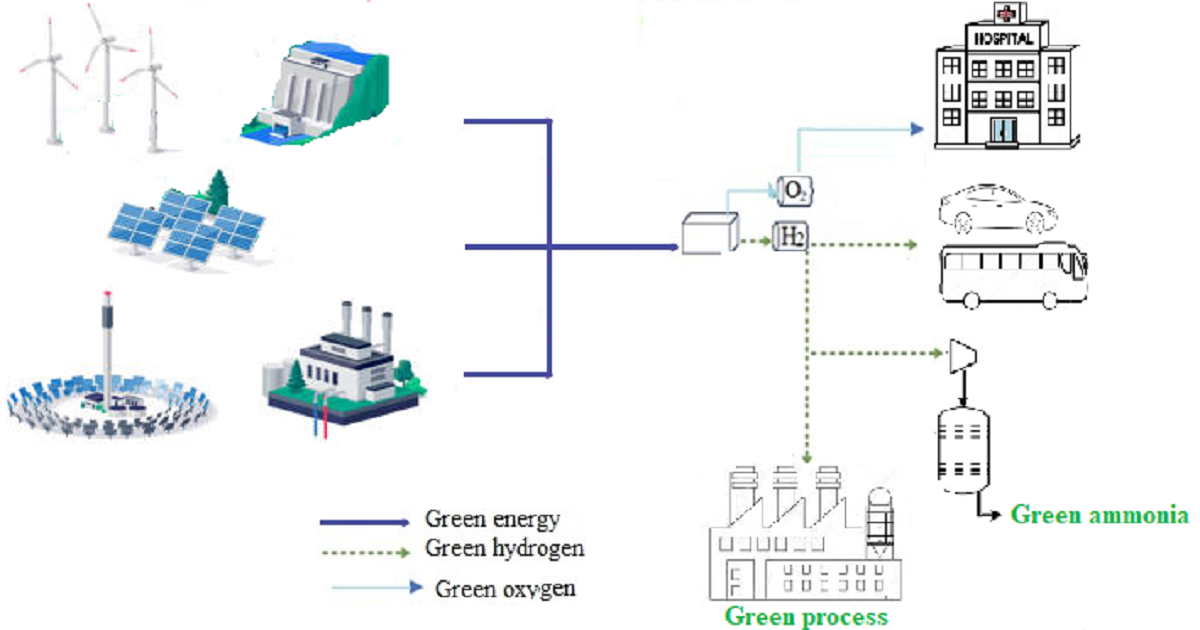- 2.8Impact Factor
- 5.5CiteScore
- 16 daysTime to First Decision
Recent Advances in Green Hydrogen Production Processes
This special issue belongs to the section “Energy Systems“.
Special Issue Information
Dear Colleagues,
The Intergovernmental Panel on Climate Change Special Report (IPCC, 2018) was addressed to governments in relation to reducing the greenhouse gas (GHG) emissions and limiting global warming to 1.5 °C above pre-industrial levels. The report stressed the need for a global shift from conventional to renewable energy due to increasing energy demand, fossil fuel scarcity, high costs, and environmental concerns. Such a transition can lay the groundwork for decarbonization targets and achieve net-zero CO2 emissions by 2050. This report addressed the production and utilization of hydrogen gas, because this is the only fuel without GHG emissions. In particular, if it is produced from renewable energy sources, including hydroelectric, wind, solar, biomass, and biogas, it is the cleanest fuel and is called green hydrogen (GH2). Therefore, it is important to publicize research and reports on the subject, to contribute to the technological development of green hydrogen production.
We are pleased to invite you to submit your scientific contribution to the Special Issue, entitled “Recent Advances in Green Hydrogen Production Processes”, in the journal Processes. In this Special Issue, original research articles and reviews are welcome. Articles on GH2 production are welcome, as well as any report containing information on GH2 production such as photofermentation, biomass fermentation, and water electrolysis, which are powered by hydroelectric, photovoltaic, wind, or geothermal energies.
We look forward to receiving your contributions.
Prof. Dr. José Carlos Curvelo Santana
Guest Editor
Manuscript Submission Information
Manuscripts should be submitted online at www.mdpi.com by registering and logging in to this website. Once you are registered, click here to go to the submission form. Manuscripts can be submitted until the deadline. All submissions that pass pre-check are peer-reviewed. Accepted papers will be published continuously in the journal (as soon as accepted) and will be listed together on the special issue website. Research articles, review articles as well as short communications are invited. For planned papers, a title and short abstract (about 250 words) can be sent to the Editorial Office for assessment.
Submitted manuscripts should not have been published previously, nor be under consideration for publication elsewhere (except conference proceedings papers). All manuscripts are thoroughly refereed through a single-blind peer-review process. A guide for authors and other relevant information for submission of manuscripts is available on the Instructions for Authors page. Processes is an international peer-reviewed open access semimonthly journal published by MDPI.
Please visit the Instructions for Authors page before submitting a manuscript. The Article Processing Charge (APC) for publication in this open access journal is 2400 CHF (Swiss Francs). Submitted papers should be well formatted and use good English. Authors may use MDPI's English editing service prior to publication or during author revisions.
Keywords
- green hydrogen
- green ammonia water electrolysis
- new material
- distribution logistics
- life cycle assessment
- renewable energies
- production
- accounting
- levelized cost of hydrogen

Benefits of Publishing in a Special Issue
- Ease of navigation: Grouping papers by topic helps scholars navigate broad scope journals more efficiently.
- Greater discoverability: Special Issues support the reach and impact of scientific research. Articles in Special Issues are more discoverable and cited more frequently.
- Expansion of research network: Special Issues facilitate connections among authors, fostering scientific collaborations.
- External promotion: Articles in Special Issues are often promoted through the journal's social media, increasing their visibility.
- e-Book format: Special Issues with more than 10 articles can be published as dedicated e-books, ensuring wide and rapid dissemination.

